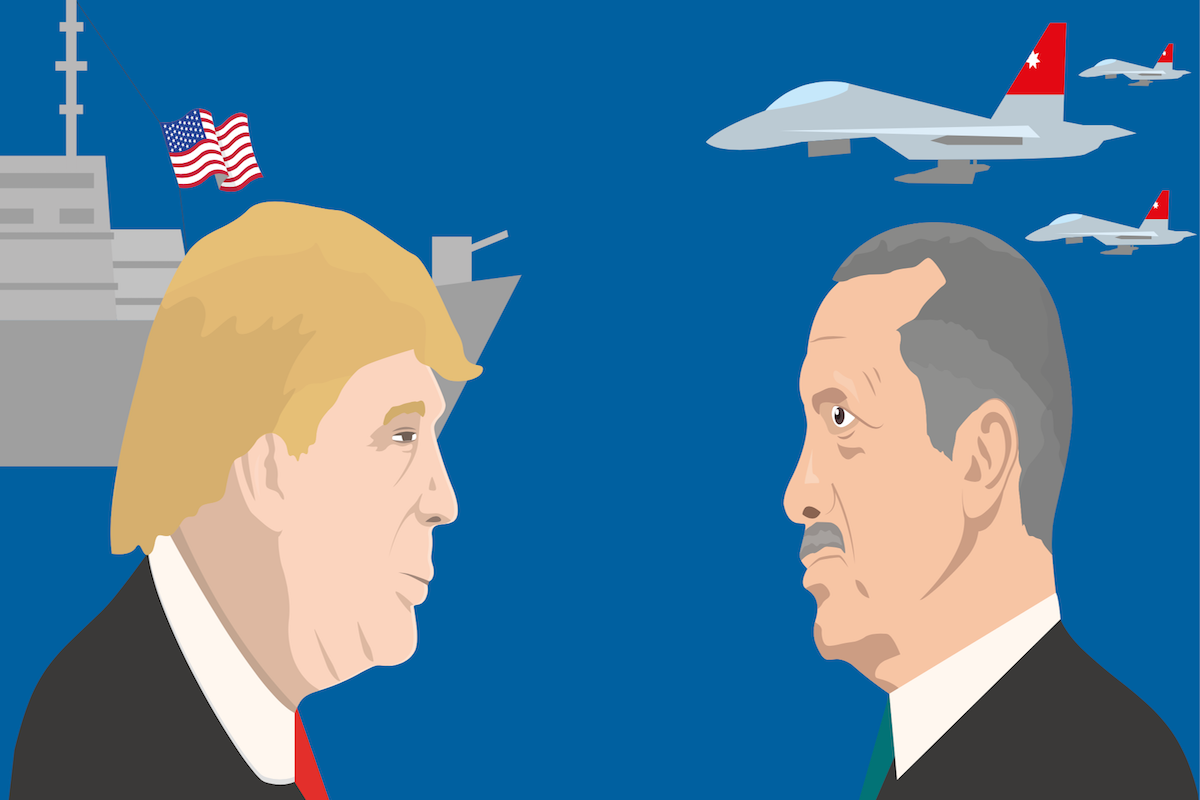US President Donald J. Trump has conveyed US concerns over escalating violence in Syria’s Afrin province to Turkish government during his telephone talks with Turkish autocratic President Recep Tayyip Erdoğan on Wednesday evening and has reminded him it risks undercutting the shared goals in Syria.
The mention about risking “conflict between Turkish and American forces” in the statement released by White House has been interpreted as a stern warning to Erdoğan regime on how things can get escalated very quickly, forcing the US to respond Turkey with military action. In a strongly worded readout, Trump also expressed concern about the destructive and false rhetoric coming from Turkey,” where US citizens and employees have been detained.
Erdoğan and Trump discussed the ongoing Turkish military operation in Afrin, Syria in a phone conversation on Wednesday, the Turkish presidency said. They exchanged views on the latest developments in Syria and Operation Olive Branch launched by Turkey on Saturday with a view to fighting off threats from PYD/PKK and ISIL terrorist organizations, according to a statement made by Turkish Preseditential Office.
The phone conversation between the two leaders focused on the importance of bilateral cooperation in fighting terrorism, while Erdoğan stated that the goal of the operation was to clear Afrin off terrorist elements for Turkey’s national security, the statement added.
According to a report by state-run Anadolu news agency (AA), during the phone conversation, Erdoğan underlined that the military operation was in line with international law, and based on Turkey’s legitimate right to defend itself under Article 51 of the UN Charter, as well as the UN Security Council resolutions regarding fight against terrorism. Erdoğan has also reiterated Ankara’s request from Washington to stop providing arms to the PYD/YPG terrorists in Syria.
Meanwhile The White House has also released a written statement over the conversation. The readout of Trump’s telephone talk with Erdoğan is as follows:
“President Donald J. Trump spoke today with President Recep Tayyip Erdoğan of Turkey. President Trump relayed concerns that escalating violence in Afrin, Syria, risks undercutting our shared goals in Syria. He urged Turkey to deescalate, limit its military actions, and avoid civilian casualties and increases to displaced persons and refugees. He urged Turkey to exercise caution and to avoid any actions that might risk conflict between Turkish and American forces. He reiterated that both nations must focus all parties on the shared goal of achieving the lasting defeat of ISIS. And both Presidents welcomed the return of more than 100,000 Syrian refugees back to their country in the wake of the ongoing defeat of ISIS and pledged to continue to cooperate to help people return home.
President Trump invited closer bilateral cooperation to address Turkey’s legitimate security concerns. The leaders discussed the need to stabilize a unified Syria that poses no threats to its neighbors, including Turkey. President Trump also expressed concern about destructive and false rhetoric coming from Turkey, and about United States citizens and local employees detained under the prolonged State of Emergency in Turkey. The two leaders pledged to improve the strategic partnership between the United States and Turkey, particularly in fostering regional stability and combating terrorism in all its forms, including ISIS, the Kurdistan Workers’ Party (PKK), al-Qa’eda, and Iranian-sponsored terrorism.”
Late Wednesday, Turkish official sources have denied the White House readout released after President Erdoğan and Trump’s phone call, saying that the text does not reflect the true nature of the phone call, according to report by pro-government Turkish media.
“Trump did not express concern over a so-called escalating violence as a result of Turkey’s anti-terror operation in Afrin,” sources said. “There was merely an exchange of views between the presidents.”
Trump never used the expression “destructive and false rhetoric coming from Turkey”, but expressed discomfort about criticisms directed to his country, sources said in a rebuke to the readout. The state of emergency in Turkey was also not mentioned during the call, the sources said, despite the fact that the White House readout alleged that Trump expressed the US’ concern about “prolonged state of emergency in Turkey.”
Sources added that the US side emphasized the importance of avoiding confrontation between Turkish and US forces in the region. The Turkish side also reiterated that YPG/PYD terrorists must withdraw from Manbij, and that the Free Syrian Army (FSA) can protect the area from potential ISIL terror if needed.
Turkish Foreign Minister Mevlüt Çavuşoğlu has also said his US counterpart proposed a 30-kilometer safe zone in Afrin region. According to a report by AA, on the sidelines of the assembly of foreign ministers’ meeting, which was held in Paris on Tuesday, Çavuşoğlu met US Secretary of State Rex Tillerson. The Afrin issue topped the agenda in the meeting and Tillerson told Çavuşoğlu that the proposed 30-km safe zone would address Turkey’s security concerns.
Turkey’s Deputy Prime Minister Mehmet Şimşek has also said on Wednesday that American policy on Syria is inconsistent as it supports one terrorist group in order to defeat another, is a speech he made at the World Economic Forum’s (WEF) annual meeting in Davos, Switzerland.
“Sometimes we are also finding it very hard to understand what our friends up to. There is a form of communication but there is also what they do on the ground. There are inconsistencies,” Şimşek told a session on “Finding a New Equilibrium in the Middle East”.
About the US policy to support the terrorist PYD/PKK, Şimşek said that “What puzzles us is that US has opted to choose a terrorist organization to fight another vicious barbaric terrorist organization, which is ISIL.” He added that “This is not the right strategy.” Calling the US policy a “dialogue of death,” he said that “We would like to see more moves towards recognition of these concerns.”
















